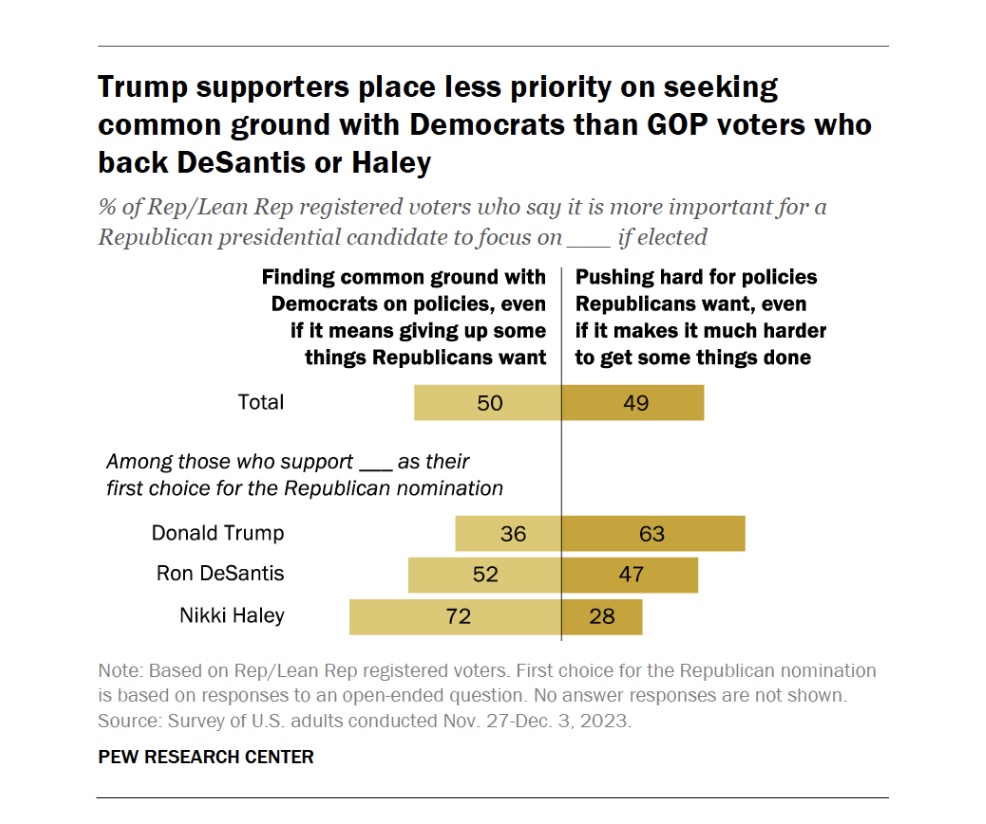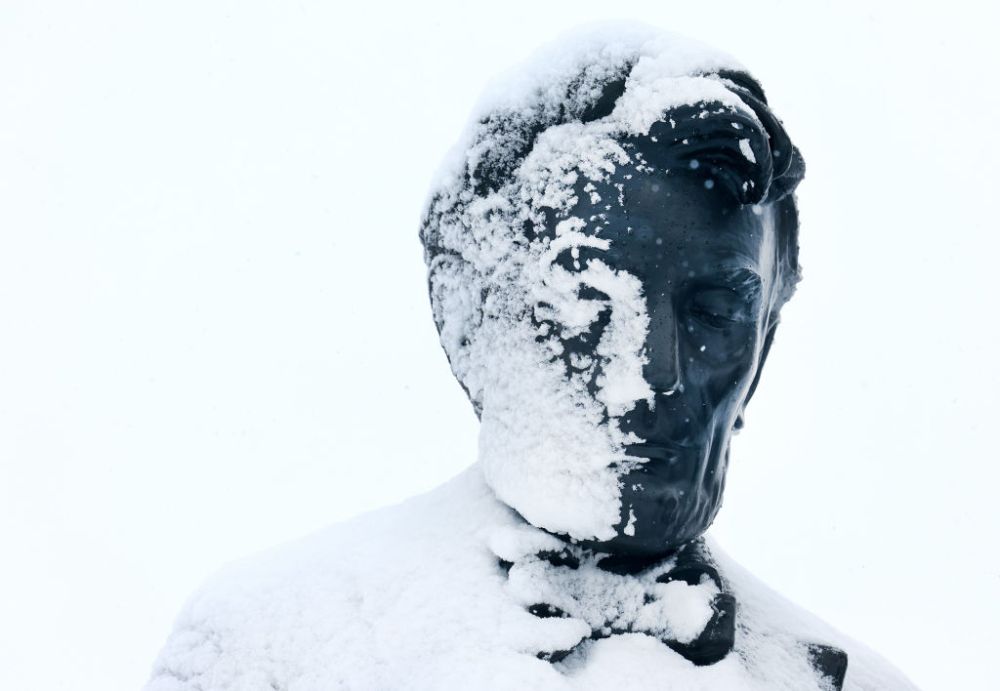CLEAR LAKE, Iowa—The mother of all Iowa caucuses was the Democratic contest in 2008, when an estimated 240,000 folks came out for the showdown between Hillary Clinton and Barack Obama.
That was nearly 100,000 more than the number who showed up four years earlier on the Democratic side, which we thought at the time was a pretty dramatic contest, what with the “Dean Scream” and all that.
But even at nearly a quarter-million participants, we should remember that Obama’s victory year was still small compared to a regular general election. Even if you add in the 119,188 Republicans who came out for the contest between Mike Huckabee, Mitt Romney, Fred Thompson, and John McCain, you’re still only at about a quarter of the turnout for a typical general election here.
Even when they’re big, the Iowa caucuses are still small. Unlike an election—with early and absentee voting and quick trips to your polling place on Election Day—going to caucus can take two or three hours and involves listening to speeches and talking to strangers. In a world of contactless delivery, the caucuses are intimate.
Also, to beat the competition for the title of “first in the nation,” Iowa goes early in the year. That often means January, and January in Iowa is no joke. I can attest to this since I am writing to you from a motel in the middle of an expanse so icy and forbidding that it hurts just to look at. It took me two days of canceled and delayed flights, including a detour through Minneapolis, where I gave up and rented a car, to get here. And I’m not even where I’m supposed to be yet. When they closed Interstate 35 because of high winds and blizzard conditions, I pulled off to take refuge.
Then I remembered that Clear Lake was the place where Buddy Holly, The Big Bopper, and Richie Valens died traveling in winter weather, so I hung up my newsman macho act and bedded down for the night. That’s when you’re learning the game …
I’ve been coming here for 12 years, and have seen plenty of bad weather, canceled flights, and snow, but I’ve never seen this. The National Weather Service is forecasting the coldest-ever caucus night on Monday, with wind chills gusting to nearly 30 degrees below zero.
This will certainly be the coldest caucus since 2004. In the intervening years, the weather has been, by the standards of the Upper Midwest, mild: no precipitation and highs in the 30s and 40s. But in that year of the Dean fizzle, it was bitingly cold, a low of 2 degrees with strong winds, and it had snowed for three days prior.
It won’t just be the weather dampening turnout this year, either. There’s no Democratic contest, so that cuts down on the vibes for voters. When both parties are at it, it produces a reciprocal effect. It’s a bigger story and reminders are everywhere—more of a happening. Not this year.
Also missing this year is much of a contest. Former President Donald Trump has led by more than 20 points in every installment of the Des Moines Register’s gold-standard poll from guru Ann Selzer.
I’ve been convening focus groups and chatting up folks in and out of politics out here since the summer, and Republicans are, to a degree I’ve never seen, underwhelmed with the whole thing. In 2016, the weather was good, the race was hot, and Democrats were cooking, too. Iowa Republicans were abuzz. Now, not so much.
In 2016, 186,932 Republicans went to caucus, the most ever. No record will be set this year, other than by the temperatures.
We’re probably not going back to the days before 2004, when fewer than 100,000 Republicans typically participated. That was when it was just a straw poll, and pretty much the domain of party activists. The caucuses were a Democratic thing. In 2000, George W. Bush won a smashing victory with 35,948 votes. Now, it’s more, but not entirely, direct democracy and Republicans have gotten used to the process. But it’s still reasonable to expect a substantial dropoff from eight years ago.
In 2016, there were 615,066 “active” Republican voters eligible to participate. At last count for this year, it’s 594,533, thanks in part to a migration away from both parties to the ranks of the unaffiliated.
Even with a lower baseline, we’d still have to assume that the turnout will be lower for all the reasons above. In 2016, Republican turnout topped 30 percent of active voters. In 2012, it was just above 20 percent. If they repeated that performance, we’d be looking at fewer than 119,000 voters—nearly 70,000 fewer than eight years ago. When we think about the dull race, one-party participation, and the bad weather, we might see even less. It’s easy to imagine that we might see the lowest turnout since 2000.
And that’s what has me out here freezing my decimal points off. I’m not a big fan of high-turnout elections, since they’re usually a sign of bad times and an unhappy electorate. A low-turnout caucus? I’m in love.
When you shrink the pool of participants, weird things happen. I don’t mean to suggest that I think Trump is going to lose, but when the difference between a commanding victory at 51 percent and an embarrassing 39-percent plurality is just 13,000 voters or so, there’s a lot of potential for surprises.
Trump didn’t win in 2016, but he certainly mobilized a lot of first-time caucusgoers, particularly among the state’s large white working-class population. It’s not unreasonable to guess that lower-propensity voters who may have caucused only once eight years ago will fall off at a higher rate than the more affluent suburbanites who then backed Ted Cruz and Marco Rubio and now likely back Ron DeSantis and Nikki Haley.
That’s why Iowa, especially in a low-wattage year and in a deep freeze, makes for such an interesting test. It shows you which candidates’ voters have the fire to propel a campaign. If Trump’s MAGA loyalists pull on their snow boots and stomp to the caucuses here, it’s a good bet that he can meet expectations elsewhere. If Trump roughly matches his 32-point lead in the last Register poll in these conditions, he’s steaming straight to the nomination.
But if it’s half that or less, things get interesting. And if second place goes to Haley—who is surging in New Hampshire, which votes just eight days later—we might just have a real race on our hands.
If only we could feel our fingers in the cold.
Holy croakano! We welcome your feedback, so please email us with your tips, corrections, reactions, amplifications, etc. at STIREWALTISMS@THEDISPATCH.COM. If you’d like to be considered for publication, please include your real name and hometown. If you don’t want your comments to be made public, please specify.
STATSHOT
Biden Job Performance
Average approval: 39.6%
Average disapproval: 57.8%
Net score: -18.2 points
Change from one week ago: no change
Change from one month ago: ↓ 1.6 points
[Average includes: USA Today/Suffolk: 39% approve-58% disapprove; Fox News: 43% approve-57% disapprove; Quinnipiac: 38% approve-58% disapprove; NYT/Siena: 39% approve-57%; Gallup: 39% approve-59% disapprove]
Polling Roulette

TIME OUT: BYRD, MAN
New York Times: “To anyone in America in the 1930s and the decades that followed, Adm. Richard E. Byrd’s name was attached to the extreme limits of human exploration in the uncharted Antarctic. His exploits to the so-called White Continent played out in breathless newspaper coverage in real time: ‘Byrd, in Isolation, Reports Blizzard.’ New York City threw him not one, not two, but three ticker-tape parades. … He was a prominent fixture at the Explorers Club, a New York City institution dating back to the early 1900s. Its members have visited the earth’s poles and peaks, from the summit of Mount Everest to the ocean’s deepest points, in the Mariana Trench. And they carried with them the club’s cherished flags, with the E and C logo. … Known as Flag No. 98, it has been missing for more than 70 years, and many at the Explorers Club believed it had been lost to the brutally harsh elements on its journey to the Antarctic. Yet here it was at an auction house in Massachusetts, in pristine condition.”
WITH CHRISTIE OUT, HALEY LANE WIDENS IN NEW HAMPSHIRE
Wall Street Journal: “The former New Jersey governor’s abrupt exit comes as Republican voters will make their first selections in the Iowa caucuses on Monday, followed by the New Hampshire primary eight days later. … Ahead of his town hall Wednesday, audio of Chris Christie speaking to someone was broadcast over his campaign’s livestream channel in which he appeared to be criticizing [Nikki Haley]: ‘She’s gonna get smoked and you and I both know it, she’s not up to this.’ He also said Florida Gov. Ron DeSantis called him, ‘petrified.’ … ‘There’s no question [Haley] benefits from this,’ said Jim Merrill, a GOP strategist. … A poll by CNN and the University of New Hampshire released earlier this week showed Christie with the support of 12% of likely Republican primary voters in the state. Trump had fallen to 39%, while Haley had moved up to 32%. … Acknowledging the threat, Trump has increasingly attacked Haley.”
Haley must carry momentum into Super Tuesday: Politico: “In South Carolina, Haley trails Trump by a wide margin in the polls. And the state’s rapid growth — and Trump’s grip on the party — means it’s a different state than when Haley first won the governorship in 2010. … Which means Super Tuesday on March 5 looms as Haley’s moment of truth, the proving ground when the GOP learns once and for all if she’s the viable Trump alternative DeSantis was supposed to be. Roughly two-thirds of all GOP delegates will be allocated in March, the bulk of them on March 5. … Among the 15 states up for grabs that day: California, North Carolina, Texas and Virginia. … To go farther, Haley will need a few surprise finishes accompanied by strong performances in some traditionally blue states.”
Ramaswamy staffers look for an exit: Axios: “Vivek Ramaswamy won’t be on the Illinois GOP primary ballot, some of his campaign staffers have begun looking for work elsewhere, and he [didn’t] qualify for Wednesday’s final televised debate before Iowa's caucuses. … Ramaswamy has poured much of his campaign’s energy into a good showing Monday in Iowa’s caucuses, where he’s predicted he’ll finish no worse than third — above either Nikki Haley or Ron DeSantis and behind former President Trump, the front-runner. [But] polls in Iowa indicate Ramaswamy is running fourth. … GOP officials tell Axios that they’ve received job inquiries from multiple Ramaswamy campaign staffers since early November. One offered to start work on Feb. 1 — after the Iowa and New Hampshire contests, but before Super Tuesday on March 5.”
LANDRIEU LATERALS TO BIDEN REELECT
Politico: “Mitch Landrieu, senior adviser and infrastructure implementation coordinator, is leaving the White House to join President Joe Biden’s reelection campaign as national co-chair. Landrieu, the former mayor of New Orleans, joined the Biden administration in 2021 following the passage of the Bipartisan Infrastructure Law. … Biden campaign manager Julie Chávez Rodríguez said Landrieu would bring a ‘unique and valuable experience’ to the reelection. … Landrieu’s move comes as some top Democrats have raised concerns about the campaign structure and have suggested that some of Biden’s top White House advisers should move over to the campaign.”
DEMS STAFF UP IN RED-STATE BATTLEGROUNDS
The Hill: “Senate Democrats’ campaign arm announced it is making its first investment in organizing staff in Montana and Ohio. … The Democratic Senatorial Campaign Committee (DSCC) said in a Monday release it is making an eight-figure investment for staff on the ground in those states. … The investment will fund staff focused on field organizing, field training programs to increase volunteer capacity, data and analytics, voting access and protection and outreach to communities of color and other specific constituencies. … Montana Sen. Jon Tester (D) and Ohio Sen. Sherrod Brown (D) will be two of Republicans’ top targets for the 2024 Senate elections.”
Jordan joins Moreno’s growing list of endorsements: The Hill: “Rep. Jim Jordan (R-Ohio) is backing Trump ally Bernie Moreno in the race for his home state’s Senate seat. … In a statement from Moreno’s campaign, Jordan said he is ‘proud’ to stand alongside former President Trump and Sen. JD Vance (R-Ohio) in endorsing Moreno. ‘Bernie is a true America First conservative, and will make us proud in the U.S. Senate,’ Jordan said in the statement. … But polls show he faces a tough race against Brown in the general election. … [In a November poll], Brown beat Moreno in a hypothetical election with 42 percent of support to Moreno’s 32 percent.”
While Illinois billionaire backs LaRose: Columbus Dispatch: “A group backing Secretary of State Frank LaRose’s U.S. Senate bid laid low in 2023 as LaRose’s campaign struggled to keep up with his wealthy opponents. Now, the Leadership for Ohio Fund is back − thanks to $3 million from Illinois billionaire [Richard Uihlein] and GOP megadonor. … The super PAC spent nearly $1.5 million for an ad released Monday that focuses on LaRose's military service and the U.S.-Mexico border.”
Rosendale replacements line up as congressman nears Senate bid: MTPR: “[State Sen. Ken Bogner], a three-term Republican state senator and Marine Corp veteran from Miles City, has launched a campaign for Montana’s eastern U.S. Congressional district. … The seat is held by U.S. Rep. Matt Rosendale, who’s hinted at challenging U.S. Sen. Jon Tester this year, but has not made an official announcement. [Bogner] previously told KTVH that he would only run for the House if Rosendale decided to leave the seat.”
Pennsylvania poll: Casey leads McCormick: Quinnipiac: “In the U.S. Senate race in Pennsylvania, incumbent Democratic Senator Bob Casey leads Republican challenger David McCormick 53 - 43 percent. In October, Casey led McCormick 50 - 44 percent. In today’s poll, Democrats (94 - 4 percent) and independents (55 - 39 percent) back Casey, while Republicans (87 - 9 percent) back McCormick. ‘A big infusion of Indie support makes one of the most closely watched Senate races in 2024 a not so tight race,’ added [polling analyst] Tim Malloy.”
Fundraising Roundup:
The Hill: “Progressive Rep. Ruben Gallego (D), who is running for independent Sen. Kyrsten Sinema’s seat in Arizona, announced Monday that his campaign raised an impressive $3.3 million in the fourth quarter of 2023, collecting an average of $29 from more than 114,000 donations. Gallego’s fundraising haul exceeds the $2.1 million that former television news anchor and Senate Republican candidate Kari Lake raised between mid-October and the end of December.
Nevada Independent: “Sen. Jacky Rosen (D-NV) raised $3.2 million in the fourth quarter of 2023 and heading into her 2024 re-election bid has $10.6 million in cash on hand — a record for an incumbent senator in Nevada at this point in the election cycle. The $3.2 million figure is Rosen’s best three-month fundraising total of the cycle thus far…”
Pennsylvania Capital Star: “U.S. Sen. Bob Casey (D-Pa.) raised more than $3.6 million in the fourth quarter, his campaign announced, which included over 59,000 contributions from more than 36,000 donors. … As of October 2023, Casey’s campaign had $7.4 million cash on hand. … Casey’s likely Republican opponent David McCormick reported Monday that his campaign raised $6.4 million in the fourth quarter, including $1 million of his own money.
BRIEFLY
Michigan, Nevada GOP hit ‘rock bottom’—Politico
Indiana GOP Reps. Bucshon and Pence both to retire—Axios
How New York’s Kathy Hochul could decide the House in 2024—Politico
Dems prep to spend big in state legislature specials—NBC News
WITHIN EARSHOT: FIELD OF DEANS
“Sometimes if you build it, they don’t come.”—Democratic presidential candidate Rep. Dean Phillips (D-MN) speaks to reporters after no voters turned up to his “Government Repair Truck Coffee Conversation” event in Manchester, New Hampshire.
MAILBAG
“The dilemma for me now is who do I vote for in the Republican primary? … All of them represent a threat to democracy in various ways and to various degrees since they all support Trump and The Big Lie. None of them, except Chris Christie, will admit to and speak the truth and BE TRUTHFUL. … And maybe I’m wrong about the other R candidates. I guess I can throw away my vote on Chris Christie (if he doesn’t drop out) but is that the wisest option? Or maybe the answer is not to remain a Republican and try to influence the direction of the party but to give up on them completely, suck it up and register as a Democrat. Trying to be an Independent in Arizona does not work.”—Julie Richardson, Prescott, Arizona
You were reading the tea leaves correctly, Ms. Richardson! Though I’m sure being prescient about Christie’s departure, which took place shortly after you sent your message, is cold comfort for one in your situation. But you have lots of time, relatively speaking, to sort things out. The Arizona Republican Party won’t hold its primary until March 19, long after Iowa, New Hampshire, and South Carolina, but also two weeks after Super Tuesday (March 5) and the week after another delegate bonanza, which includes Georgia’s 59 delegates. On the week you are set to vote, Arizona is a big prize with 43 delegates, but not nearly as big as Florida (125), Ohio (79), and Illinois (64). By the time the hot potato comes to you, more than half of the total 2,429 delegates will have been awarded. Indeed, by the time the race gets to you, it will most likely already be over. Even if it isn’t, consider your role in the contest. In Arizona’s 2016 Republican Primary, there were 624,039 votes cast. Assuming a similar turnout, we could express the value of your individual vote as a percentage thusly: 1.602×10^-4 percent. Or we could just put it this way: Take it easy on yourself! You’re one vote out of hundreds of thousands for 43 delegates on a day when millions more will vote for the 368 delegates up for grabs. That’s a very long way of saying that you ought to vote for whomever you like best, or don’t vote at all. But, I understand that you’re thinking less about what your vote will do to the race than what your vote will do to you. Voting is the way we shape our government, but it is also a way we sort out our own feelings and allegiances. Many times, we vote against candidates more than we vote for them, which is fine—as long as the candidate who is the vehicle for your opposition isn’t themselves odious in some way. That’s even more so with symbolic votes, ones like those you refer to as “throw away.” What’s the point of a protest vote that sends the wrong message? There is, however, an inverse correlation between the direness of the one you’re trying to block and the standards to which you hold the alternative candidate. In one famous Louisiana election, a Klansman was running against a former governor previously convicted of corruption. The bumper stickers read: “Vote for the crook, it’s important.” I have every confidence you’ll know the right thing to do when the time comes. Until then, you can just watch the storm roll in.
“The ‘shy Tory’ phenomenon in British politics is well-known—that the Tories consistently outperformed their polls because many Tory voters were reluctant to admit it to pollsters. I’ve pretty much been wrong at every step about Trump’s electoral prospects since 2016, and I’m not sure if this might be a real thing or if I’m just grasping at straws for a non-horrible 2024, but is it possible there’s something similar among Republicans who might be less than 100 percent behind the orange former game show host? Also, unlike with British Tories, there’s a genuine risk in many places from the very real contingent of violent psychopaths within Trump’s supporters.”—David Connor, Reston, Virginia
I would caution, Mr. Connor, about equating things being well known with things being true! This has been discussed ad nauseam when it comes to polling errors in elections involving Trump. The argument is that people don’t want to admit to pollsters that they’re supporting someone of Trump’s character, so they lie to pollsters. This has been known in American politics as the Bradley Effect, particularly when black candidates are on the ballot. Unwilling to tell interviewers they are voting against the more socially desirable candidate, voters don’t tell the truth. I’m not going to tell you that there’s nothing at all to this kind of social desirability phenomenon, but I think it has been frequently and powerfully overstated. British polling is notoriously bad, so that would be my first caution. But more significantly, I think, is that the problem with polling Trump voters isn’t about honesty, but availability. My friend, the great Harry Enten, made a good case here, but the short version is that it’s become increasingly hard to get older white working-class voters to participate in polls at all. They’re not lying. They’re just absent. So, as pollsters dig deeper to find a demographically representative sample, they get atypical respondents. College-educated, affluent voters, on the other hand, are much likelier to participate. You can guess what that does to the sample. You propose that the inverse of what has been claimed relating to Trump may now be taking place: That those higher propensity poll participants are lying to pollsters for the sake of social desirability. Maybe, but count me as skeptical that this is happening in a statistically significant way. But I do think you are getting at something worth considering: Late deciders. I’m certain that there are a lot of Republican voters who are neither passionately pro- or anti-Trump. Many of them may now be going with Trump out of habit. He’s the almost prohibitive frontrunner and de facto incumbent. But if this turns into a real race, many of those who are tuned out will tune in. Polls are very often wrong, but there’s a difference between being wrong and not being predictive. Races evolve, voters change their minds—even in the final hours of a contest. Stay tuned!
“A week before Iowa and I am already wringing my hands over which presidential candidate I will vote for in November. I’ve always thought of myself as a Republican but I absolutely CANNOT, I will not, vote for Trump. In the past, I have been known to hold my nose and vote Republican as a vote against the Democratic candidate. In my mind, I go through the options and each time come up with no answer. Best case, let’s say Biden maintains his cognitive abilities. He and his handlers see a reelection as a mandate to unleash the progressive wing. That makes me shudder. Worst case, a vote for Biden is a vote for Kamala Harris—no way, no how. What about a third party? Which nut job do I pick? Stay home and say, ‘Don’t blame me, I didn’t vote’? Accept that it’s only four years and the country will be fine? Uh, I dunno about that. I know many people are suffering with me. Chris, what wisdom can you share with us? (And maybe say a prayer that Trump has one too many Big Macs?)”—Nan Sansone, Chesenee, South Carolina
I know you’re only kidding about praying for the death of a political foe, and it did make me chuckle, but aside from the obvious moral problems that presents, there’s also this: It might not make any difference. Eight years ago there was a popular moral dilemma on social media: Would you kill baby Hitler? The premise being that if one could take the life of an still-innocent child to spare the lives of millions, it might be morally defensible. But what that premise forgot was that whoever would have replaced Adolf Hitler in Weimar-era German politics might have been just as bad—or worse. Whatever combination of economic, political, and demographic pressures that pushed Germany into madness would have been present with Hitler or without him. I’m not saying Trump is Hitler. As brother Jonah observes, Hitler could have repealed Obamacare. But what I am saying is that we don’t know what the sudden removal of Trump from American public life would mean. Which of his acolytes would take up the cause? How might his sudden absence further radicalize his supporters? Maybe things would get better, maybe things would get worse. But the existing dangers to the republic beyond Trump would not evaporate. By my estimation, our biggest current problem is that our culture, government, and political system doesn’t work. Our Congress, parties, news media, and the presidency itself have malfunctioned in an era of technological and social upheaval and can’t deliver the goods that voters need in order to deal with power-hungry demagogues in the way they should. When Trump is gone, whenever that is, other claimants to the throne will come forward with their promises to smash the broken order and replace it with swift, simple solutions. The urgent work for Americans of goodwill now is to shore up these battered institutions, to bring healing where there has been harm. You should pick the candidates that you like best and vote—or not—with a clear conscience and let the election go as it will. But what will matter for the next three generations is whether Americans of today can mend the tattered places.
You should email us! Write to STIREWALTISMS@THEDISPATCH.COM with your tips, kudos, criticisms, insights, rediscovered words, wonderful names, recipes, and, always, good jokes. Please include your real name—at least first and last—and hometown. Make sure to let me know in the email if you want to keep your submission private. My colleague, the cable-knitted Nate Moore, and I will look for your emails and then share the most interesting ones and my responses here. Clickety clack!
CUTLINE CONTEST: SMELLS LIKE VICTORY

Wowza! We will have to consult the ancient codex, but we have reason to believe that we received more submissions for this week’s contest than any in its history. You might think that’s because of the bizarre and hilarious photo that entrants had to work with, but I know the truth: the introduction of the annual prize of a ham has stirred your hearts, even as it raised your blood pressure.
The entries generally fell into two categories: jokes about bad odors and jokes about idolatry. I’m sorry for the many good but similar entries that we had to omit, but grateful for the laughs. Our winner, though, carried the day because it was, gosh darn it, kinda sweet.
“My mother told me she was going to hold her nose and vote for Trump.”—Gloria Wall, Mountain View, Georgia
Runner up, Smells Like Victory Division:
“Downwind!”—Mike Nelson, Bayfield, Wisconsin
Winner: Baal of the Ball Division:
“The tension mounts at the starting line of the Graven Image Rampage Run.”—Rick Whaley, Portage, Michigan
Runner up:
“And Moses said unto God … ‘Meh. Do what you must.’’”—Chad Blancett, Houston, Texas
Winner, The Very Best People Division:
“Just practicing for my Cabinet position.”—Jodi Fitzapatrick, Fresno, California
Winner, The Great Exaggerator Division:
“Mob presses Congress to expedite legislation replacing Lincoln on the penny with Trump.”—Pam Kelley, Irvine, California
Winner, English Lit Majors Division:
“Claus of Innsbruck cast this in bronze for me.”—Lynne Van Horn, Yakima, Washington
Winner, Mordor-a-Lago Division:
“Hunt them down! Do not stop until they are found. You do not know pain, you do not know fear. You will taste man-flesh!”—Jonathan Thames, Berkeley, California
Winner, Boba Fettish Division:
“Oh. They’ve encased Trump in carbonite. He should be quite well protected. If he survived the freezing process, that is.”—Joshua Bean, Bedford, Virginia
Winner, Red Velvet Division:
“Man, the ‘Cake or Fake: Donald Trump Edition’ is wild.”—Tripp Whitbeck, Arlington, Virginia
Winner, Burnt Umber-age Division:
“‘Good as new, boys,’ Donald Trump tells his personal colorists (former UAW auto body painters) as they put finishing touches on his weekly tanning session.—Richard Basuk, New York, New York
Send your proposed cutline for the picture that appears at the top of this newsletter to STIREWALTISMS@THEDISPATCH.COM. We will pick the best entrants for each week and an appropriate reward for the best of this month—even beyond the glory and adulation that will surely follow. Be hilarious, don’t be too dirty, and never be cruel. Include your full name and hometown. Have fun!
ELECTION SPIN CYCLE
Sky News: “At least three people were taken to hospital after mistakenly eating pods of laundry detergent given away as part of a campaign in Taiwan’s presidential race. One of the victims said she thought the pods—which contained colourful liquid—were sweets, despite instructions written on a bag that each can wash [nearly 18 pounds] of clothes. The Nationalist Party has said they will clarify to the public that these pods are ‘laundry balls, not candies.’ Among the trio taken for treatment were an 80-year-old man and an 86-year-old woman, both of whom were discharged after having their stomachs flushed.… Campaigns for the presidency are in their final stretch, with the country heading to the polls on Saturday amid rising tensions with China, who lay claim to the island nation’s territory.”
Nate Moore contributed to this report.







Please note that we at The Dispatch hold ourselves, our work, and our commenters to a higher standard than other places on the internet. We welcome comments that foster genuine debate or discussion—including comments critical of us or our work—but responses that include ad hominem attacks on fellow Dispatch members or are intended to stoke fear and anger may be moderated.
With your membership, you only have the ability to comment on The Morning Dispatch articles. Consider upgrading to join the conversation everywhere.